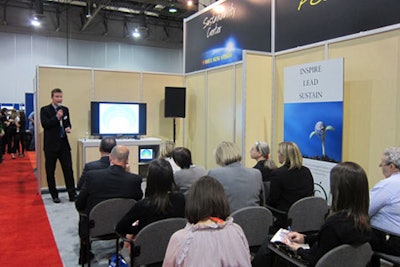
Among the big topics this week at IMEX America is sustainability. (Indeed, the conference itself has a detailed sustainability plan that covers the trade show venue, hotels, catering, print material, signage and carpeting, general service contractors, and transportation.) In the "Sustainability Center" on the trade show floor at the Sands Expo, Meeting Professionals International's manager of corporate social responsibility and sustainable events, Roger Simons, addressed the ways in which sustainability trends are shaping the meeting industry.
For hosts and planners still exploring sustainability, Simons suggested that emissions is a solid place to start, since it's a tangible topic that people can grab hold of, measure, and try to reduce. "People are looking at their business travel, and thinking how they can reduce their emissions," Simons said. "Though we’re not very sophisticated or mature yet as a group." Simons said that $9 billion is spent each year on travel for mission-related business around the world, and that 93,000 federal employees—that's just in government alone—are using 24 million room nights of hotel space in 8,000 locations. That means a big opportunity to work on emissions.
Another factor contributing to the sustainability trend that may extend to meetings is the success of products like Toyota's Prius, fair-trade coffee, and Whole Foods market. "People want them," Simons said, pointing to a greater willingness and interest in the conversation as a whole, from the consumer to the corporate marketer or association event planner.
Another big trend: responsible business. "It will grow and grow as more and more people are looking at the reports that companies are doing on corporate responsibility and [see they are becoming] more sophisticated." Simons cited two examples of companies doing positive things that are impacting their supply chains: Procter & Gamble, which is using measurement standards and protocols to analyze its supply chain, and Wal-Mart, which is asking its supply chain what it can do to improve and is starting to create sustainability scorecards. Meeting organizers, too, are increasingly asking their suppliers about their sustainability practices.
Further, Simons said in the sustainability trends session, "We’re seeing more and more products being ranked on how they’re addressing their sustainability. It could be something that’s coming round the corner for the meetings industry. People like a benchmark. We’re seeing it in hotels, and we’re likely to see it more and more in meetings."
He sees competition as a means of propelling sustainable meetings forward—and it's already under way. "As soon as one company addresses it, the rest want to catch up." He cited a study in which 93 percent of C.E.O. respondents across industries think sustainability is critical to the future of their business, with brand trust and reputation, revenue growth, customer demand, and employee engagement and recruitment among the reasons they choose to adopt sustainable practices.
Other innovative ways sustainable practices are being integrated into meetings, he cited—other than the obvious and now commonplace recycling—include smartphone or tablet apps that enhance events and give fresh info without paper updates; hotels like Hyatt offering rebates for meeting amenities like tap versus bottled water; community involvement in green and community-minded projects on- or off site; and hybrid meetings—that last topic already proving a controversial one in the early days of IMEX America.



















